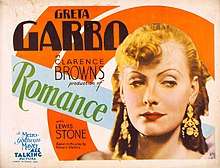Romance (1930 film)
Romance is a 1930 American Pre-Code Metro-Goldwyn-Mayer film directed by Clarence Brown, starring Greta Garbo, Lewis Stone, and Gavin Gordon.
| Romance | |
|---|---|
.jpg) | |
| Directed by | Clarence Brown |
| Produced by | Clarence Brown |
| Written by | Edwin Justus Mayer Bess Meredyth Edward Sheldon (play) |
| Starring | Greta Garbo Lewis Stone |
| Music by | William Axt |
| Cinematography | William H. Daniels |
| Edited by | Hugh Wynn |
| Distributed by | Metro-Goldwyn-Mayer |
Release date |
|
Running time | 76 minutes |
| Country | United States |
| Language | English |
The movie was adapted by Edwin Justus Mayer and Bess Meredyth from the 1913 play by Edward Sheldon. A 1920 silent film also called Romance was one of the first releases by then new United Artists and starred Doris Keane, the actress in Sheldon's 1913 play.
Plot
On New Year's Eve, Harry (Elliott Nugent) tells his grandfather (Gavin Gordon), a bishop, that he intends to marry an actress, even though that is frowned upon by his social class. However, his grandfather recounts via flashback a cautionary tale of a great love affair with a "fallen women" during his own youth.
When he was 28 years old, Tom Armstrong, the son of an aristocratic family and the rector of St. Giles, meets the famous Italian opera star Rita Cavallini (Greta Garbo) at an evening party given by Cornelius Van Tuyl (Lewis Stone). Tom falls in love with Rita even though there are rumors that she is Van Tuyl's mistress. Tom's family disapproves of Rita but he continues to pursue her until he discovers that she had been lying to him about the true nature of her relationship with Van Tuyl. Though he forgives and loves her, their different lives and different social class make an engagement untenable.
Ultimately, the old bishop later married Harry's grandmother and counsels Harry to marry the woman he loves regardless of the consequences.
Cast

- Greta Garbo as Rita Cavallini
- Lewis Stone as Cornelius Van Tuyl
- Gavin Gordon as Tom Armstrong
- Elliott Nugent as Harry
- Florence Lake as Susan Van Tuyl
- Clara Blandick as Abigail Armstrong
- Henry Armetta as Beppo
- Mathilde Comont as Vannucci
- Rina De Liguoro as Nina (credited as Countess De Liguoro)
Reception
Mordaunt Hall of The New York Times wrote that "Greta Garbo's performance in Romance is perhaps as good as anything she has done on the screen."[2] And Norbert Lusk of the movie magazine Picture Play wrote that Garbo's performance "is a thing of pure beauty, an inspiring blend of intellect and emotion, a tender, poignant, poetic portrait of a woman who thrusts love from her because she considers herself unworthy of the man who offers it."[2]
In addition, Romance was considered a box office success and sold $1,256,000 in tickets.[3]
Academy Awards
Nominations[4]
- Best Actress: Greta Garbo
- Best Director: Clarence Brown
References
- Alexander Walker; Metro-Goldwyn-Mayer (October 1980). Garbo: a portrait. Macmillan. p. 184. ISBN 978-0-02-622950-0. Retrieved July 28, 2010.
- "Romance". Turner Classic Movies. Retrieved February 9, 2014.
- The AFI Catalog of Feature Films: Romance details, afi.com; accessed September 8, 2015.
- "Romance". Academy of Motion Picture Arts and Sciences. Archived from the original on 2014-02-10. Retrieved 2014-02-09.
External links
- Romance on IMDb
- Romance at the TCM Movie Database
- Romance at AllMovie
- Romance at the American Film Institute Catalog